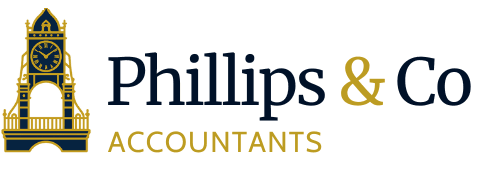Author: Phillips & Co Accountants, Chester
Date: June 11, 2025
Understanding your Income Tax can feel like deciphering a complex puzzle. With rates, bands, and various allowances, it’s easy to get lost. But for every sole trader, small business owner, and individual in Chester, knowing these fundamentals is key to effective financial planning and ensuring you don’t pay more tax than you need to.
At Phillips & Co, your trusted local accountants in Chester, we believe in making tax simple. Let’s break down the essential Income Tax rules for the current tax year (6 April 2025 to 5 April 2026).
Your Tax-Free Personal Allowance: The Foundation
The good news first: not all of your income is taxable! Everyone typically receives a tax-free Personal Allowance, which is the amount you can earn before Income Tax kicks in.
Standard Personal Allowance: For the 2025/2026 tax year, this stands at £12,570. This means your first £12,570 of income is usually exempt from Income Tax.
The £100,000 Threshold: A Key Point to Watch
If your adjusted net income goes above £100,000, your Personal Allowance starts to reduce. For every £2 your income is above £100,000, your allowance decreases by £1. This means if your income hits £125,140 or more, your Personal Allowance will be completely zero. This is a common area where individuals can unexpectedly pay more tax.
Blind Person’s Allowance: If eligible, this additional tax-free allowance is added to your standard Personal Allowance, increasing the amount you can earn before paying tax.
Understanding Income Tax Rates and Bands
Once your income exceeds your Personal Allowance, it falls into different tax bands, each with a specific tax rate.
For England, Wales, and Northern Ireland (standard Personal Allowance of £12,570):
Basic Rate: £12,571 to £50,270 – 20%
Higher Rate: £50,271 to £125,140 – 40%
Additional Rate: Over £125,140 – 45%
(Note: Income tax bands are different if you live in Scotland.)
Other Valuable Tax-Free Allowances
Beyond your Personal Allowance, HMRC offers other allowances that can reduce your taxable income:
Savings Interest: You have tax-free allowances for savings interest, meaning a portion of interest earned won’t be taxed.
Dividend Income: If you hold shares in a company, a certain amount of dividend income is also tax-free.
Trading Allowance: Your first £1,000 of income from self-employment (e.g., from a side hustle or small business) can be tax-free.
Property Allowance: Similarly, your first £1,000 of income from property you rent out (unless using the Rent a Room Scheme) can also be tax-free.
Smart Ways to Potentially Pay Less Income Tax
It’s not just about what you earn; it’s also about what reliefs and allowances you claim:
Income Tax Reliefs: Various reliefs exist that can reduce your taxable income.
Marriage Allowance: If you’re married or in a civil partnership and your income is less than the standard Personal Allowance, you may be able to transfer a portion of your allowance to your partner, potentially reducing their tax bill.
Married Couple’s Allowance: If you or your partner were born before 6 April 1935 and don’t claim Marriage Allowance, you might be eligible for this.
How Accountants Chester Can Help
Navigating Income Tax rates and allowances can be complex, especially with specific thresholds and various reliefs. Our ACCA-certified team at Phillips & Co in Chester specializes in helping individuals, sole traders, and landlords:
Understand your exact tax position.
Identify all eligible allowances and reliefs.
Maximize your legitimate tax savings.
Ensure full compliance with HMRC regulations.
Don’t leave potential savings on the table! Contact your local accountants in Chester today for a free consultation. We’re here to provide clarity and peace of mind for your finances.
Disclaimer
The information contained in this blog is for general guidance only. It does not constitute professional advice and should not be relied upon as such. Always seek tailored advice from a qualified accountant regarding your specific circumstances.
